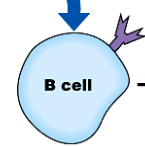The Immune System
1/20
There's no tags or description
Looks like no tags are added yet.
Name | Mastery | Learn | Test | Matching | Spaced |
|---|
No study sessions yet.
21 Terms
pathogen + types
a pathogen is an agent that causes disease
bacteria, viruses, fungi, and parasites
antigen
An antigen is any molecule that elicits an adaptive immune response
dependent molecules that protrude from pathogens or other particles.
viruses, bacteria, and mold spores.
antibody (vs antigen)
An antibody is an immune protein found in blood plasma
Antibodies attach to one particular kind of antigen and help to counter its effects
made by b cells
antigen x b cell
each b cell has an antibody on its surface that matches with a specific antigen

innate vs adaptive immunity
innate: always deployed, active immediately, same regardless of if pathogen is known
1st & 2nd line of defense/ primary response
adaptive: deployed only when infectious agent is recognized
3rd line of defense
active vs passive immunity
both adaptive immunity
Active immunity: when a person’s own immune system actively produces antibodies in response to natural or artificially antigens
Passive immunity: when a person receives pre-made antibodies that they get from their mother or pills (her exposure, vaccination, etc)
Types of White Blood Cells
Granulocytes: innate
Neutrophils, Basophils, Eosinophils
mast cell
Monocytes: both
Macrophage, dendrite
Lymphocytes: adaptive
T & B cells
Innate Response 1
1st line of defense: Skin, mucous membranes → secretions
made of phagocytic white blood cells
complement system (proteins, recruit wbcs)
Innate response 2
2nd line of defense:
phagocytic WBCs engulf pathogens
proteins
inflammatory response
phagocytic
white blood cells that engulf and digest pathogens.
inflammatory response
adaptive response WBC’s go to infected area & phagocytose pathogens, then die, and produce pus
symptoms: redness, warmth, swelling, fever
allergies
When immune system recognizes something harmless (pollen, peanuts, etc.) as a pathogen (foreign antigen) and mounts an immune response to it
2 types of adaptive immunity
Humoral Immune Response → B cells, external antigen
Cell-mediated Immune Response → Killer T cells, infected cell
Humoral Immune Response
Primary: B cells produce antibodies that flag infection→ allow T-cells to engulf
Antibodies + Macrophages kill antigens/virus inside the humors (fluids) of our body
Secondary: memory B cells & antibodies from past infections will now immediately response when pathogen reappears
tons of plasma cells are produced from b cell
Cell-mediated Immune Response
Primary: Kills cells via apoptosis, lysis, or phagocytosis: Helper T-cells trigger responses (killer-t) are responsible
Killer T-cells kill antigens/viruses in cells that are already infected.
helper t cells
stimulate B-cells to make antibodies and help killer cells develop.
killer t cells
directly kill cells that have already been infected
plasma cells
produce tons of antibodies → attach to antigens
if body doesnt work: antibiotics
antibiotics: target bacteria, disrupt making of bacterium cell wall = cytoplasm leaks, bacterium dies), & disrupt RNA, protein synthesis, & DNA replication
if body doesnt work: vaccines
vaccines: stimulate immune response without causing disease. They prepare the immune system to recognize and combat pathogens more effectively (no cell wall)
vaccines vs antibiotics
vaccines:
prevent/ taken before infection
teach bodies to produce own antibodies to recognize and kill antigen/pathogen
work against viral + some bacterial infections
antibiotics:
react/ taken after infection
target and kill bacteria
only work against bacterial infections (not viral)